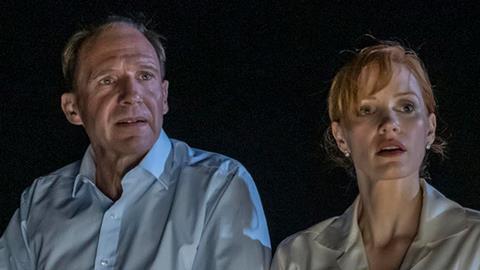The Forgiven may have been a dull picture if it had been in the hands of a less talented director. Being able to pull it off without it is a credit to writer/director John Michael McDonagh’s abilities. The Forgiven does have its dull spots, but director Martin McDonagh’s ear for dialogue and the precision with which he crafts his scenes keep the picture moving at an engaging pace for the majority of its 117-minute running time. Considering the subject matter of The Forgiven, that could come as a surprise. The film is set in Morocco and follows a group of wealthy elites as they party at a desert property over the course of a single weekend. When David Henninger (Ralph Fiennes) and his wife Jo (Jessica Chastain) are driving to the film’s major party, they accidentally run over a little Moroccan child who steps in front of their car.
It is only just that Abdellah (Ismael Kanater) insist that David travel into the Moroccan desert together with him in order to bury his kid. David, hesitantly, accepts the proposal. For the rest of The Forgiven, there are two storylines: David’s trek into the desert and the party he attends with his friends and wife. Using both views, McDonagh brilliantly juxtaposes the frivolous, extravagant celebration hosted by the film’s affluent elites with the harsh emotional and physical realities of what life may be like for the Moroccan population. Because of that juxtaposition, McDonagh’s film The Forgiven is a quasi-social satire, but despite the filmmaker’s insightful insights, they don’t add up to much.
A mishap in the desert
Even if none of The Forgiven’s dialogues ever come to fruition, it’s still a blast seeing them play out. When Jo calls David a “highly-functioning alcoholic” in the film’s opening scene, he responds by stating “I’ve always assumed that the ‘highly-functional’ half should cancel out the ‘alcoholic’ portion,” and that moment is a great summation of what every dialogue in The Forgiven is like. At every opportunity, the characters in the film make light of their flaws while refusing to concede any ground. Throughout his career, McDonagh has demonstrated a mastery of the art of crafting conversation. McDonagh’s lines are devoured by the film’s stellar ensemble, which includes some of the most talented actors working today.
For example, Caleb Landry Jones and Christopher Abbott wink and chew their lines more than any of their co-stars, emphasising the lunacy of their characters’ behaviour. Matt Smith has the finest ear for McDonagh’s dialogue, according to the film. Jo and David’s lives are upended when Smith plays Richard Galloway, the homosexual guy who arranges the party that throws their lives into turmoil. There are some characters in the film that are as conscious and shameless as Richard is, which is to say that even though his and his friends’ activities are disgusting, Richard takes great pleasure in participating in them. Richard spends the majority of the film poking fun at his friends’ insecurities, and Smith delivers each line with the same easy smile and laid-back demeanour.
A deserving voyage of exploration
The Forgiven’s David, played by Ralph Fiennes, is the one who must bear the heaviest burden. In contrast to Smith’s Richard, David is compelled to undertake an emotional and physical journey throughout The Forgiven’s plot. After spending more time with Abdellah, Abdellah’s son’s father, David comes to realise that he is a victim of his own arrogant irresponsibility and that his life is weighed down by the weight of his own existence. Anouar (Sad Taghmaoui), Abdellah’s right-hand man, helps David realise the gravity of what he has done. Consequently, David’s self-absorbed, sarcastic manner is finally replaced by an overpowering sense of humiliation, which Fiennes, to his credit, portrays well in the movie.
His steady and understated performance in The Forgiven is a powerful reminder that Fiennes is one of Hollywood’s most gifted actors. Although we’ve seen this story before, it’s a little disappointing that David’s metamorphosis from a self-absorbed member of society to someone who cares about people who are less fortunate has been so well-documented. However, despite the film’s seeming dedication to the Moroccan characters, it is ultimately David’s journey that serves as its heart and soul. This makes his metamorphosis all the more arduous. The picture loses much of its dramatic weight because of the dreary monotony of his quest.
An insincere apology
It’s impossible not to sense that McDonagh is going to upend David’s path with a subversive twist in The Forgiven because of how hard-edged and slickly crisp so much of the film is. But it never arrives. McDonagh, on the other hand, concludes the film’s narrative in a way that is neither emotionally impactful nor lyrical. McDonagh’s 2014 film Cavalry had a conclusion that evoked the same misguided savagery, but this one fails to equal the weight of that picture. The Forgiven’s underwhelming ending is disheartening, considering how exact and attentive everything is building up to it. Rather than a piercing or compelling morality story, the film comes off as a compilation of well-deservingly caustic judgments because it fails to provide anything fresh to an old subject. That may be a sin that can be forgiven by some people. The Forgiven, on the other hand, depicts a narrative that is, sadly, less than the sum of its well-executed components.
On Friday, July 1, The Forgiven will open in cinemas.

